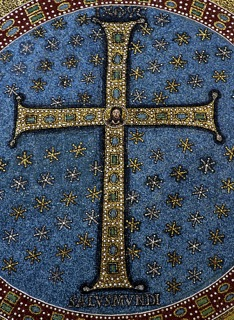Sunday Reflection with Fr Robin Gibbons - 13 May 2018

Cross Sant'Apolinare in Class-Ravenna
Seventh Sunday after Easter 2018
"I do not ask that you take them out of the world but that you keep them from the evil one. They do not belong to the world any more than I belong to the world. Consecrate them in the truth. Your word is truth".(Jn 17:15-17)
We don't tend to talk about Hell in the way our ancestors did! For them, at least over the past seven hundred years, it was a defined place, often understood, not in terms of deprivation but of pain and much suffering, 'the torments' of Hell is a description I remember hearing quite often!
However not everybody agreed with this dreadful concept of eternal punishment, even amongst the ancient traditions of the Church there are dissenting voices who contrast this terrible image with the love that is God, for once we add the words 'divine mercy' into our vocabulary the God who is Love makes Hell seem something very eccentric indeed.
Part of our problem as Christian apologists is that we often add on more to the original scriptural references about a topic and then hold fast to that further picture and often literally. I'm not against saintly visionaries, but I will not put their teachings ahead of anything scriptural, even more so when the language and imagery they use comes from a very particular milieu. In John's Gospel, chapter 17, Jesus prays that those who follow him might be protected from the evil one. The literal amongst us might say, "yes, the devil!' But is this what is meant? If you take a look at what the devil is understood to be in the Scriptures you may get a surprise, for a start there are a number of interpretations and in some cases several devils. Looking careful at doctrinal history and the scriptures it soon becomes clear that there isn't one seamless understanding of Hell and the Devil at all, but there is a warning about the activity of sin and evil in our lives!
Where does this leave us on our own faith journey? Firstly, all of us need to remember just what has happened in the death and resurrection of Christ. We believe that sin has been conquered, redemption offered, death vanquished, but not in one single unequivocal way. Secondly, we understand how these words and phrases about Christ can be interpreted in different ways and this is good for us, why? Because it means that thirdly, we too must search for answers, wrestle with the living God like Jacob, keeping in mind what St Isaac the Syrian said: "God is not one who requites evil, but He sets aright evil." That's the thing! Evil cannot dominate or overcome us in Christ!
In this day and age, when our world is filled with lies (the real fake news), when prominent figures who should know better, give example to us of extreme mendacity and corruption, the task of Jesus' disciples is clear, to hold firm to the Word of truth that is Christ and place our trust in the gift and work of the Spirit who is our advocate and helper! As Gregory of Nyssa wrote: "We seek above all, in the case of God, signs of his goodness ". (Gregory of Nyssa. Address on Religious Instruction. 12:20)
Lectio Divina
St Isaac of Nineveh (Isaac the Syrian) On the Love of God
Homily 28
In love did He bring the world into existence; in love does He guide it during this its temporal existence; in love is He going to bring it to that wondrous transformed state, and in love will the world be swallowed up in the great mystery of Him who has performed all these things; in love will the whole course of the governance of creation be finally comprised. And since in the New World the Creator's love rules over all rational nature, the wonder at His mysteries that will be revealed then will captivate to itself the intellect of all rational beings whom He has created so that they might have delight in Him, whether they be evil or whether they be just. (II.38.1-2)
From Gregory of Nyssa's Address on Religious Instruction (12:20)
It is universally agreed that we should believe the Divine to be not only powerful, but also just and good and wise and everything else that suggests excellence. … What is good is not truly such unless it is associated with justice, wisdom and power. For what is unjust and stupid and impotent is not good. Power, too, if it is separated from justice and wisdom, cannot be classed as virtue. Rather it is a brutal and tyrannical form of power. … We seek above all, in the case of God, signs of his goodness (12.20).


















